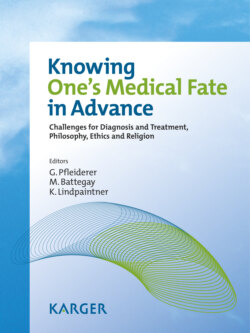Читать книгу Knowing One's Medical Fate in Advance - Группа авторов - Страница 18
На сайте Литреса книга снята с продажи.
Questions and Answers
ОглавлениеQ. [Klaus Lindpaintner]: There is a mutation in the CCR5 receptor, the delta 32 mutation, which is actually protective against a negative outcome of a HIV infection. How would you as a HIV physician feel if such a variation is present in a given patient?
A. [Battegay]: Usually if a patient is infected, the chance is very low that he has the actual mutation. Mostly, those patients who have the mutation are not infected. But you are right, some are infected and they have a better disease course. Additionally, there are other factors of the HLA, the transplantation antigen, which are associated with rapid or slow progression. We do not routinely measure such mutations but we hope to develop tests that we may use routinely to know in whom the disease will progress rapidly or slowly and to answer the question more precisely when to initiate treatment.
Q. [Mr. Gyr, Basel]: Are there populations that are less prone to become infected? For instance, in Bangladesh, they think that to be the case, but I don’t know whether there is any proof yet?
A. [Battegay]: This is a very good point. One of the most important preventive factors is male circumcision. If men are circumcised, it is estimated that the risk of HIV transmission is reduced by 60%. One theory is that in populations and societies where the percentage of circumcision is extremely high there is an effect on the population level for HIV transmission.
For example in Zanzibar, the percentage of HIV-infected people is below 1%, but in mainland Tanzania, it is around 5%. This is a very significant difference which may be due to the differences in male circumcision habits. Hence, people in Bangladesh might really be less prone to infection.
Q. [Mark Schweda]: One aspect of knowing one’s medical fate in advance in connection with HIV and AIDS in the 1980s and 1990s was by taking the HIV test. I remember a lot of people back then saying, they would not even want to take the test, or some took the test and would not collect their results. What is your experience? Or are there even any figures on how the development of therapies has influenced people’s attitudes towards taking the test?
A. [Battegay]: Again this is a very important aspect, and there is a tremendous change in many ways. In Western countries, the HIV test has become almost routine and the attitude towards it is more ‘relaxed’. Knowing that one is HIV-infected is very important as there are very good treatments available, and also in order to prevent transmission of the disease to others. As stated, transmission can be reduced by effective treatments. In Africa, awareness has changed immensely and the test frequency has increased sharply since treatments have become available. Before that, HIV testing was not performed as there was no hope of treatment. Secondly, there is pressure urging for the tests to be carried out more often so that a more precise prevention program can be initiated. Basically, we go back to the principles of infectious diseases. Prevention works primarily if you go to the people who are already infected. This is a basic principle, because, if you try to use prevention all over, people get disinterested or are not convinced. It is observed now throughout Africa that voluntary counseling and testing went up sharply especially in the vicinity of treatment clinics. This is a very strong argument for having the programs installed in many places. Many people in Africa are willing to take on the responsibility of prevention and treatment programs. The main challenges will be at the operational level with difficult circumstances in everyday life.
Q. [Georg Pfleiderer]: Can you perhaps say something more about this so-called subjective factor? How do people deal with it? There are huge numbers of people living with HIV today, in a sort postsymptomatic or asymptomatic condition. Could you tell us something about the strategies of dealing with this situation? Is getting the diagnosis still the most important moment in their life? Or has that also changed? Is it still a central element of their personal identity to be an HIV-positive person?
A. [Battegay]: First, I think it is important not to generalize and it is difficult to really know ahead what a patient will perceive. Some patients say they take the drugs in the morning and don’t think about it at all for one moment before or afterwards. It lies beside their toothpaste and that’s it. Obviously, they continue to function in life as they had done before. HIV has become routine.
For most patients though, I feel it is still a burden. It affects a central place in their life: their relationships and their sexuality. Also, it is a lifelong disease with lifelong treatment. Mostly, after the first phase, persons have adapted fairly well. They inform close friends and family and they experience that life can go on quite normally. What has brought about a huge difference is the possibility for couples to have children. Also an issue is convincing their friends and family that they will not necessarily die. This often takes some time. Although patients themselves feel very good, it takes a while until their families stop asking them all the time, ‘how are you?’, ‘how do you feel?’. Hence, there is a whole variety of reactions, and yes, certainly, there are the dramatic moments in the beginning that prevail, but thereafter a lot of the trust comes back.
